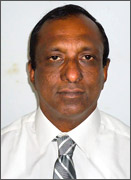Revisions to metal sector export policy needed
Indunil Hewage
The private sector emphasizes the need to revisit metal sector policy
while studying its strengths to mitigate weaknesses for economic
development. The Government banned scrap metal imports in October 2010
for six months. The ban imposed in October for six months is still
continuing.
Agriculture Machinery Manufacturers Association Chairman Melvin
Samarasinghe said iron, copper and aluminium are mainly benefiting from
the ban.
|

Melvin Samarasinghe |
The largest contribution is being made by the steel industry which
produces over 15,000 tonnes per month to the value of Rs 1.5 billion per
month and the value addition is over 50 percent of the London Metal
Exchange (LME) scrap value.
He said copper industry value addition for export of copper rods was
lower than the LME scrap price in October 2010.
This value addition has been 50 percent lower than the local industry
value addition, which is, plus 40 percent to LME copper price even when
compared with a simple product like a brass hinge. The ban on copper has
therefore helped the local industry but today there is no brass scrap
for the local industry as this has leaked out of the country through
other channels.
Samarasinghe said the aluminium industry value addition was worse due
to non segregation of scrap but after the ban the segregation of scrap
commenced and the value of locally produced aluminium using scrap
extrusions increased by 20 to 30 percent which is plus 50 percent of the
LME price benefiting locals.
“This needs to be streamlined after closing the gaps,” he said.
“There should be a transparent system for import and export of raw
material benefiting local value addition for economic development.
The policy should be free from regular revisions therefore the best
and the simple way out is to use the globally existing HS Codes for
export of finished metal goods and to facilitate import of raw material
for the local industry. The export of any value added metal products
should be at least 20 percent more than the LME based metal prices as
any of our imports of finished goods are not less than the global raw
material price,” Samarasinghe said.
Exporting value added finished goods will definitely benefit economic
development, productivity and employment generation as these items could
also be further value added to electric cable, electrical contacts,
springs and screws which could help many more industries.
“In applying to the metal sector we are paying the value of material
of different products which is sometimes cheaper but not buying the
complete product with its deliveries. Our machinery users are getting
blunt day by day and we are becoming more dependent on other countries.
We are now contributing to adding value to industries in other
countries than our own country. If we continue this process we will have
to close local metal industries,” Samarasinghe said. |



